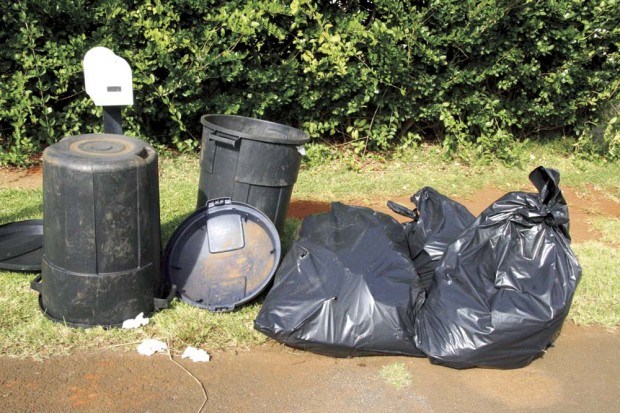LIHU‘E — A county trash collection fee for property owners went into effect July 1, adding a few dollars per month to real property taxes. Residential properties are now paying a base monthly assessment fee of $6, plus a curbside
LIHU‘E — A county trash collection fee for property owners went into effect July 1, adding a few dollars per month to real property taxes.
Residential properties are now paying a base monthly assessment fee of $6, plus a curbside collection fee of another $6. Commercial fees, including fees for transient vacation rentals, is $84 per month.
The Kaua‘i County Council in September unanimously approved a bill that some said marked the end of free trash collection, while others said such services were never free because Solid Waste Division subsidies come from the county’s General Fund.
Ordinance 905 states that households that use automated trash pick up are entitled to one 96-gallon trash bin. If the collection services are manual, up to three 32-gallon receptacles — or the equivalent volume of bagged trash — are allowed.
If residents have more trash than what is specified in the ordinance, they can opt to pay more to have the extra trash collected.
A county press release on Thursday stated that households that generate more refuse than the specified limits can request more receptacles for an additional $12 per month.
“This option provides up to three 32-gallon receptacles for manual curbside collection or one 96-gallon receptacle for automated service,” the release stated.
Commercial establishments that go over the limit will have to pay an additional $84 per month if they want the extra trash picked up.
Additionally, from now on forgetfulness may cause residents to take a trip to the dump.
“If their trash is not at the curb at pick-up time, residents need to take it to the transfer station,” said Allison Frailey, Solid Waste Program Coordinator.
However, there is no fee for residents at the transfer stations or the Kekaha Landfill, according to Frailey.
“The base assessment in the (residential refuse collection assessment) covers these costs so we don’t need to charge at the gate,” she said.
The county is also asking customers with manual service to mark their containers with their street address or to post their address on the refuse bags to assist refuse crews with determining whose trash is whose.
The new RRCA fee will be used in part to defray operating expenses at the refuse transfer stations, according to the release.
“Residents with an adjusted gross income of $40,000 per year or less that qualify for a low-income exemption on their property taxes under Section 5A-11.4 (d) of the Kaua‘i County Code will automatically receive a 50 percent reduction on their refuse collection assessment,” the release stated.
The fee will appear as a line item on real property assessments, which are due every six months.
The county website states that the fee is a separate assessment in the property taxes and is not tax deductible.
“The RRCA is anticipated to generate approximately $3 million per year if no one cancels collection services,” states the website, adding that the county anticipates a cancellation rate of up to 25 percent, in which case the fee will generate $2.67 million.
Visit www.kauai.gov/rrca for more information on Ordinance 905.
• Léo Azambuja, staff writer, can be reached at 245-3681 (ext. 252) or lazambuja@ thegardenisland.com.


